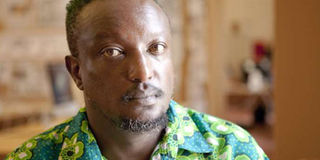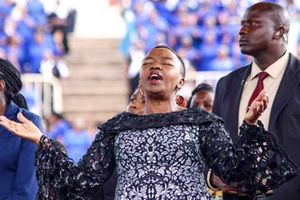What, pray, is there to celebrate about 2016?

Except for Yvonne Owuor and Binyavanga Wainaina (pictured) , whose writings remain talking points in literary circles even beyond Kenya, none of the current writers is serious enough; we are stuck with the old guards like Ngugi wa Thiong’o, Rebecca Njau perhaps, Jared Angira in poetry, and Francis Imbuga in drama for well-thought literature.
FILE PHOTO | NATION MEDIA GROUP
What you need to know:
- I am aware of some literary efforts made, these past few years, by the likes of Ng’ang’a Mbugua and Kinyanjui Kombani, whose recent writings could only excite a few media reviews, but nothing much of critical responses in Kenya and beyond.
- Even their lesser known contemporaries like Anthony Mugo and Peter Kareithi can only bask in the glory of having won a local literary prize but beyond that, darkness.
I don’t know much about what happened on the Kiswahili literary scene because, despite my best efforts, I remain functionally illiterate in that beautiful language such that, even when I read and enjoy Tom Olali’s Mashetani wa Alepo, I remain uncertain of my understanding of the text. And so on Kiswahili literature I shall not speak.
On literature in English, nothing happened. And nothing much has happened in the past few years, 2016 only happened to be the least productive of them all. Over the few years gone, Kenya has had little to offer the world, let alone Africa or East Africa. We have been content with the ephemeral flashes of literary imagination that we read once in a while in blogs.
Except for Yvonne Owuor and Binyavanga Wainaina, whose writings remain talking points in literary circles even beyond Kenya, none of the current writers is serious enough; we are stuck with the old guards like Ngugi wa Thiong’o, Rebecca Njau perhaps, Jared Angira in poetry, and Francis Imbuga in drama for well-thought literature.
I am aware of some literary efforts made, these past few years, by the likes of Ng’ang’a Mbugua and Kinyanjui Kombani, whose recent writings could only excite a few media reviews, but nothing much of critical responses in Kenya and beyond.
Even their lesser known contemporaries like Anthony Mugo and Peter Kareithi can only bask in the glory of having won a local literary prize but beyond that, darkness.
REGRETTABLE STATE
The main reason for this regrettable state is that our literary journalists and other critics lack the moral strength to pronounce the sad truth that novels such as Mbugua’s Different Colours and Kombani’s Den of Inequities, Mugo’s Ask the Stars, Kareithi’s Komu Fights for Change, or even poetry collections like Adipo Sidang’s Parliament of Owls, are products of apprentice aspirations that may be worthy of acknowledgement, but certainly not of literary celebration through critical engagement.
The younger generation of Kenyan writers appear to be stunted at the age of literary innocence where stylistic innovation or thematic nuancing are clearly beyond their grasp. Their narrative approaches, which barely go beyond mere chronicling of events, tend to leave us with documentaries in prose rather than novels that can help us peep into their characters and our own struggles with the challenges of being human.
Because of their obvious didacticism, most of the novels that have emerged out of Kenya in the past ten years or so have failed to philosophize some of the dominant challenges of the day and, hence, they cannot dislodge the Kenyan canon of Ngugi’s or Meja Mwangi’s works on colonialism and urban poverty, for instance.
Ngugi, like his west African counterparts Ferdinand Oyono, Mongo Beti and Chinua Achebe are great, not so much because they wrote about the so-called ‘big’ theme of colonialism, but because they philosophised the theme to give us different perspectives regarding how colonialism tore into the body and soul of both the coloniser and the colonised.
Even Meja Mwangi’s cartography of urban poverty in Going Down River Road was executed in a manner that neither glorified poverty nor apportioned easy blame for its prevalence.
The same literary sophistication has been demonstrated by MG Vassanji and a few other Kenyan Asian writers whose major focus is on historical and contemporary experiences of racial minorities.
These old-guards knew something about both the medium and the craft; Oyono’s and Beti’s humour, Ngugi’s flashbacks and Achebe’s use of supreme irony, were all trained on the idea and reality of colonial violence. They all critically thought through structuring techniques around which entire narratives swivelled, unlike the current generation of writers, some of who suffer a troubled relationship with the English language and its workings, giving us poorly edited apologies for novels.
IF ONLY SUCH BASIC PROBLEMS WERE CORRECTED
Yet, every time I decry the mediocrity of recent novels, I have been accused of disproportionate harshness and of killing talent. The truth, however, is that in some of these recent novels, readers are punished by simplistic thematisation, awkward constructions, unused commas, and numerous instances of unnecessary padding.
If only such basic problems were corrected before the novels were offered to readers, perhaps such works would go on to win regional and international prizes and raise the country’s creative profile.
It doesn’t help much that Ng’ang’a Mbugua, for instance, has repeatedly won several of our local prizes, this only raises valid questions about the meaning of those particular prizes in the larger world of literature.
What is urgent is for him and his publishers to ask good questions about the lukewarm critical reception that the author and others of his standing have attracted beyond the print media reportage and social media commentaries.
I often hear that local writers of the current generation have been failed by local critics who pass harsh judgements against emerging works. My view is that, if we local critics have failed, it is because we have been accomplices in praising publications that are not praiseworthy, and which have failed to carry their weight beyond the country.
As critics, a few of us have embraced the uncritical positions of political correctness, simultaneously praising works that should never have been published in the first place, while taking to social media to vilify the other few who have dared to ask our authors and publishers to raise the bar. By celebrating mediocre works, these critics have continuously lowered literary standards while creative writers have continuously failed to achieve those low standards.
Writers from other parts of the continent have clearly laboured, despite their youthful age, to write novels of literary endurance. Fiston Mwanza from DRC and Chimamanda Adichie from Nigeria are just two of those whose works have caught the attention of critics globally. Indeed, old-guards like Ngugi stamped their authority in the strength of their youth, as did the colossi of Caribbean literature, Derek Walcott and George Lamming. You may also include the monuments of 20th Century American fiction – Ernest Hemmingway, John Steinbeck, James Baldwin, Ralph Ellison, and Richard Wright. Young Kenyan writers should read extensively and learn the craft, because being youthful is no reason to be hopeless writers who humour themselves with ideas of grandeur.
As we welcome 2017, we should vow to speak truth to writers when they get it and when they miss it. Only then shall we exorcise the ghost of mediocrity that haunts our contemporary literature.
The writer teaches literature at the University of Nairobi




